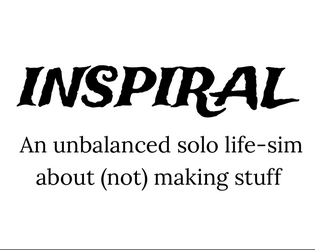It's probably been suggested by now but it would be nice if your attack/defense was also forecasted for the result of a hand, like your health and power.
David Perry
Creator of
Recent community posts
Glad you are giving it a try! Yeah, as dice, the 1 and 6 should be treated as max/min values. Another unstated process is, when determining a random new/old project, I've been rolling a D6 but interpreting it as a D2/3/4/6, whichever equates to roughly half the total projects, counting from the respective end of the track.
Also FYI I updated it to 1.4.3 yesterday, so check that if you don't have it already.
In a sense. However it is not necessarily restricted to dungeon delving; OSR games should handle just about any situation you'd find in any other game or setting. And yes, you don't set out to tell a story that the GM has planned out, but it can certainly produce wonderfully interesting stories that come about as the result of play - the interactions of the players and the game world as portrayed by the GM, even if that takes the form of a bunch of anecdotes stitched together. Often stories you hear from OSR sessions sound so strange and creative that there's no way it could be the result of a planned narrative.
Another difference is that "solving" a problem in an OSR game does not have a number of discrete solutions that are codified into it (though roguelikes tend to allow a greater range of potential solutions than other types of games). Instead, the GM should be open to those wildly creative methods of solving problems formulated by the players. Often, a GM doesn't even know how a particular problem could be solved when they create it.
I personally don't unreservedly endorse this list for what definitively constitutes an OSR playstyle; and indeed no one is putting it forth as definitive. Googols of electrons have been spilled on this subject elsewhere. But, addressing the points that you dislike:
Re: 6, I think 4 supersedes it and it is not terribly important to defining the OSR playstyle.
Re; 8, I'm not sure you elaborated on that?
Re: 10, I agree, and I don't think *literal, frequent lethality* is definitive of the OSR playstyle; I personally play with some house rules that cause wounds which decrease ability scores at 0HP, though taking significant damage in one stroke can still spell instant death. The point is real, harsh (if warranted) consequences for your actions to help accentuate PCs' agency and a reactive world, rather than situations like 5e clerics reviving people to fighting condition literally before a turn passes while surrounded by foes.
I'm still having trouble with the idea that the OSR only would have rules for direct conflict/combat, when avoiding that is entirely the point of the game. D&D's rules are mostly about combat too, and many other games have a similar framework, but in those games the combat is the point. It feels incredibly counter-intuitive to have a game where the point is to not use the rules.
I'm not quite sure where this came from. Most OSR rulesets do not "only have rules for direct conflict/combat". I think the usual defense of detailed rules for combat is that it represents a high-stakes situation, and so the involved parties likely will desire clear arbitration of how things occur. But check Into the Odd's combat system for a counterpoint:
http://www.bastionland.com/2015/03/describing-auto-hit-in-into-odd.html
http://www.bastionland.com/2017/05/decisive-combat.html
...oh, I guess I already have an account, so I can post here without any work!
Here's my compilation/synthesis of advice on running OSR style games, which many folks share as an answer to this question. You'll probably also see another, older "OSR Primer"; this is kind of like that, but from a more modern perspective, and somewhat less contentious.
Love it! You should combine forces with First Person Soar! http://itch.io/jam/7dfps/rate/13738
Gorgeous! I've always wanted such a simple game.
I can't help myself from suggesting some ideas...
- I feel like the flapping should give you more vertical lift than propel you forward, and forward motion would require gaining some height and then diving.
- The control guide says to put both sticks to the side for a turn, but it seems best to put one stick up and the other down for a turn.
- Given the above, any chance of a vertical axis inversion option? Turning feels reverse to me.
- I would feel great to have flapping be analogue with the triggers - the flap occurs on release, with power in proportion to the depth it was pressed.




